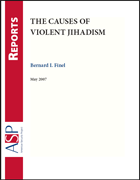
The Causes of Violent Jihadism
The United States is currently in a struggle against violent, self-described “jihadists” who have struck at the United States and U.S. interests across the globe. In order to develop sound, workable and sustainable policy responses, we must understand both the nature and scope of the challenge.
This report examines the sources, causes and scope of the challenge posed by violent jihadism and offers broad conclusions that may be useful in developing more effective policy to address the global threat.
The broad outlines of the conclusions are simple: there are multiple causes for violent jihadism and there are multiple communities that make up both the active and tacit elements of the movement. Beyond those broad conclusions, however, there remain stunning gaps in our knowledge of the threat. In addition to making assessments about the challenge, this report highlights the issues that are sources of major debates in the research on jihadism and areas where the empirical record is too sparse to allow for any but the broadest of generalizations.
Violent jihadism has three core causes:
- a crisis of legitimacy in the Muslim world brought on by economic stagnation, population pressures, failures of political institutions and disputes over the interpretation of religious texts;
- the foreign policies of the United States and other Western countries toward the Arab and Muslim worlds;
- pathological dynamics within the Muslim world which promote beliefs in conspiracy theories, unsubstantiated rumors and anti-Semitism.
In addition, a key finding of this report is that our jihadist enemies are not cynical manipulators of faith, but rather genuinely religious individuals whose interpretations of Islam are grounded in both scholarly interpretation and historical movements. Furthermore, they are respected by a significant percentage of the Muslim world.
This study yields four important policy recommendations:
- American public diplomacy efforts must be refocused from providing timely, clear governmental responses to the development of relationships with credible interlocutors who can communicate American values indirectly.
- We need to develop better sources of knowledge about the social systems that support violent jihadism. There is a knowledge gap about the connections between mass beliefs and operational terror networks.
- Our attempts to delegitimize violent jihadism by securing condemnations from mainstream clerics and governmental leaders only serves to reinforce the radicals’ claims that these elites are tools of American imperialism.
- We must be much more cautious about how we wade into theological disputes.
- This report is the first of three that examine how best to secure America in an age of terror.
You can download the full report here.
The Causes of Violent Jihadism






